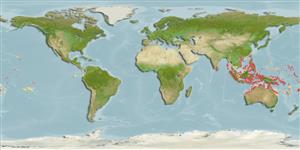Teleostei (teleosts) >
Gobiiformes (Gobies) >
Gobiidae (Gobies) > Gobiinae
Etymology: Eviota: No etymology given, suggested by Christopher Scharpt: from Latin 'eu' for 'true' and 'iota' for anything very small, in combination 'truly very small' referring to it as being the smallest vertebrate at the time it has benn described by Jenkins (thus, making the suggestion by Scharpt plausible.
More on author: Whitley.
Environment: milieu / climate zone / depth range / distribution range
Ecology
Marine; reef-associated; depth range ? - 12 m (Ref. 86942). Tropical; 23°N - 24°S
Western Pacific: southwestern Thailand to Vanuatu, north to southern Taiwan, south to the southern Great Barrier Reef; including New Caledonia, Vanuatu and Tonga.
Size / Weight / Age
Maturity: Lm ? range ? - ? cm
Max length : 2.4 cm SL male/unsexed; (Ref. 1602)
Dorsal spines (total): 7; Dorsal soft rays (total): 8 - 10; Anal spines: 1; Anal soft rays: 7 - 9. Characterized by semi-translucent grey or greenish color with intense dark spots on head; scale margins narrow brown to reddish; about six internal brown bars; base of pectoral fin with pair of dark brown spots; longitudinal scale series 23-25; ctenoid scales, absent on head, nape, breast and pectoral fin base; separated pelvic fins, thin membrane joining bases; depth of body 4.1-5.0 in SL (Ref. 90102).
Occurs at Belau's rock islands. Inhabits rubble and algal-covered patches of dead reef in 1-6 m (Ref 90102). Benthic (Ref. 75154). Feeds primarily on small invertebrates, also consumes detritus, contributing to a major trophic pathway on coral reefs. Spawning appears to be repeated on a regular cycle, semilunar or every 14 days (Ref. 116739).
Life cycle and mating behavior
Maturity | Reproduction | Spawning | Eggs | Fecundity | Larvae
Myers, R.F., 1991. Micronesian reef fishes. Second Ed. Coral Graphics, Barrigada, Guam. 298 p. (Ref. 1602)
IUCN Red List Status (Ref. 130435: Version 2024-2)
Threat to humans
Harmless
Human uses
Tools
Special reports
Download XML
Internet sources
Estimates based on models
Preferred temperature (Ref.
123201): 26.4 - 29.3, mean 28.7 °C (based on 2280 cells).
Phylogenetic diversity index (Ref.
82804): PD
50 = 0.5000 [Uniqueness, from 0.5 = low to 2.0 = high].
Bayesian length-weight: a=0.00692 (0.00284 - 0.01683), b=3.10 (2.92 - 3.28), in cm total length, based on LWR estimates for this Genus-body shape (Ref.
93245).
Trophic level (Ref.
69278): 3.1 ±0.3 se; based on size and trophs of closest relatives
Generation time: 0.2 ( na - na) years. Estimated as median ln(3)/K based on 1
growth studies.
Resilience (Ref.
120179): High, minimum population doubling time less than 15 months (Preliminary K or Fecundity.).
Fishing Vulnerability (Ref.
59153): Low vulnerability (10 of 100).
Nutrients (Ref.
124155): Calcium = 1310 [213, 19,611] mg/100g; Iron = 7.31 [1.17, 35.47] mg/100g; Protein = 17.5 [14.0, 20.9] %; Omega3 = 0.0766 [, ] g/100g; Selenium = 221 [10, 3,634] μg/100g; VitaminA = 6.71 [0.13, 285.87] μg/100g; Zinc = 17.1 [3.8, 53.8] mg/100g (wet weight);
